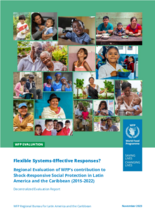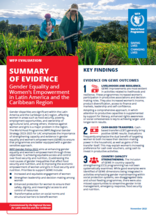Bolivarian Republic of Venezuela
- 692,000
- people assisted by WFP in 2023
- 11
- number of states where WFP works
- 29.3 million
- population
Access to good quality and nutritious food continues to be a challenge for a large number of families in Venezuela (Bolivarian Republic of). This issue is compounded by the impact of global supply chain disruptions and food-price increases.
Despite economic improvements since 2021, a nutritious and diversified diet has become increasingly expensive for Venezuelans. The frequency and intensity of climate-related disasters such as floods, drought and landslides, among other factors, continue to impact food systems. This poses a major challenge to agriculture, food production and livelihoods. In this context, access to food remains the main challenge to food security and an issue of concern for many families across the country.
WFP activities in Venezuela include the provision of school meals and food assistance for vulnerable populations, support to climate risk management, resilience building and strengthening of food systems infrastructure and logistical capacity.
WFP continues to apply age, gender and diversity lenses throughout all its programmes, including tailored interventions to meet the needs of people with disabilities and of Indigenous communities.
The goal is to support more than 1 million people with food assistance by the end of 2025.
What the World Food Programme is doing in Venezuela
-
School meals
-
WFP’s school meals programme started in Venezuela in 2021, and includes take-home food baskets. The main recipients are children and school personnel, including people with disabilities who attend special education schools. Hot meals began in April 2023 in three municipalities in Falcon and will be rolled out across other schools that WFP is supporting. Nutrition education and community-engagement activities are integrated with the school meals programme.
-
Capacity strengthening
-
WFP is working with partners and school staff to strengthen their capacities to ensure that the school meals programme is implemented safely, respecting hygiene measures and humanitarian principles. WFP provides training on these topics to school staff and field partners. Some of these activities are conducted in partnership with the National Institute of Nutrition.
-
Emergency preparedness and response
-
WFP helps to mitigate the impact of climate emergencies that affect food security, by providing emergency-response training to national institutions and strengthening contingency plans at local level. In emergencies, WFP also provides direct food assistance to people, as well as logistical and coordination support to partners.
-
Coordination
-
WFP is leading the Logistics Cluster and co-leading the Food Security Cluster, together with the Food and Agriculture Organization of the United Nations. WFP provides humanitarian partners with access to common services to ensure an effective response during times of crisis, avoid duplication and maximize coordination among partners.
Venezuela (Bolivarian Republic of) news releases
Go to pagePartners and donors
Find out more about the state of food security in Venezuela (Bolivarian Republic of)
Visit the food security analysis pageOperations in Venezuela (Bolivarian Republic of)
Contacts
Office
Avenida Francisco de Miranda, Edificio Parque Ávila, Caracas 1060, Miranda, Venezuela
Venezuela

.jpg?itok=BM3-pig5)


